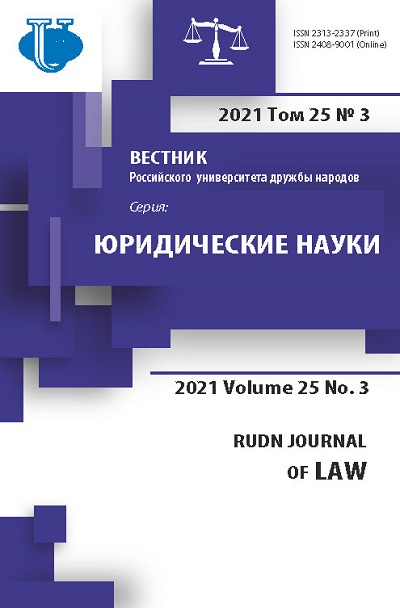Integration of “smart” technologies in the civil proceedings of the People’s Republic of China
- Authors: Rusakova E.P.1
-
Affiliations:
- Peoples’ Friendship University of Russia (RUDN University)
- Issue: Vol 25, No 3 (2021)
- Pages: 622-633
- Section: PROCEDURAL LAW. PROSECUTOR SUPERVISION
- URL: https://journals.rudn.ru/law/article/view/27221
- DOI: https://doi.org/10.22363/2313-2337-2021-25-3-622-633
- ID: 27221
Cite item
Abstract
The concept of creating digital justice is not quite new in the modern world, but its implementation takes place in various countries in different ways. China has achieved tangible success, where artificial intelligence technologies are gradually being integrated into judicial proceedings. A robot judge is a real mechanism for resolving a dispute, and people's attitude to this form of protection of the fundamental right guaranteed by the state is mixed, but as practice shows, this method is acceptable in the era of the digital revolution. The research purpose is to identify the main trends in the process of integrating “smart” technologies in the civil proceedings of the People’s Republic of China based on artificial intelligence technologies. The research has identified 1) common for all countries stages collaboration between artificial intelligence and humans; 2) various obstacles to introduction into the judicial system of independent units specilising in dispute resolution that are connected with Internet; 3) basic technologies required to create “smart” courts; 4) main tasks for ensuring social guarantees in the digital form of civil rights protection; 5) main trends in the process of digitalization of civil proceedings. The study led to the conclusion that artificial intelligence technologies have deeply penetrated the Chinese justice system, radically changing all judicial activities, as well as procedural institutions. Close cooperation of IT companies, judicial community and government agencies ensured the success of this process.
About the authors
Ekaterina P. Rusakova
Peoples’ Friendship University of Russia (RUDN University)
Author for correspondence.
Email: rusakova-ep@rudn.ru
ORCID iD: 0000-0001-6488-0754
Candidate of Legal Science, Associate Professor, Associate Professor of the Department of Civil Law and Procedural Law and Private International Law, Law Institute
6 Miklukho-Maklaya str., Moscow, 117198, Russian FederationReferences
- Dudin, M.N., Shakhov, O.F. & Shakhova, M.S. et al. (2019) Digital Technologies as a Driver of Intellectual Stratification of Human Resources: Socio-Economic Inequality. International Journal of Recent Technology and Engineering (IJRTE). 8 (2), 4436-4440
- Dudin, M.N., Frolova, E.E., Protopopova, O.V., Mamedov, A.A. & Odintsov, S.V. (2019) Study of innovative technologies in the energy industry: Nontraditional and renewable energy sources. Entrepreneurship and Sustainability Issues. 6 (4), 1704-1713
- Gaivoronskaya, Y.V., Miroshnichenko, O.I. & Mamychev, A.Yu. (2019) The immodest charm of digitalization. Legal Concept. 18 (4), 40-47.
- Guo, M. (2018) China’s cybersecurity legislation, it’s relevance to critical infrastructures and the challenges it faces (Review). International Journal of Critical Infrastructure Protection. (22), 139-149.
- Guo, M. (2021) Internet court’s challenges and future in China. Computer Law & Security Review (40), 105522. Doi: https://doi.org/10.1016/j.clsr.2020.105522
- Gronic, I. (2020) Electronic trial in Western Australian civil process. Eurasian Law Journal. 12 (151), 60-61. (in Russian).
- Huang-Chih, S. (2020) Can Online Courts Promote Access to Justice? A Case Study of the Internet Courts in China. Computer Law & Security Review. (39), 105461. Doi: https://doi.org/10.1016/ j.clsr.2020.105461
- Edwin, L. & Yong, C. (2018) Special Cyber Court and E-Court. Available at: https://gltlaw.my/2018/05/24/special-cyber-court-and-e-court/ [Accessed 21 April 2021]
- Inshakova, A.O., Frolova, E.E., Rusakova, E.P. & Kovalev, S.I. (2020) The model of distribution of human and machine labor at intellectual production in industry 4.0. Journal of Intellectual Capital. T. ahead-of-print, No. ahead-of-print. doi: 10.1108/JIC-11-2019-0257
- Khabrieva, T.Y. (2018) Law Facing the Challenges of Digital Reality. Journal of Russian Law. 9(261), 5-16. doi: 10.12737/art_2018_9_1. (in Russian)
- Kuznetsov, M.N. (2020) The Impact of Digitalization on Some Guidelines for Civil Procedure. Vestnik of Moscow City University. Series “Legal Sciences”. 2 (38), 58-67. Doi: 10.25688/ 2076-9113.2020.38.2.06. (in Russian)
- Rusakova, E.P. & Inshakova, A.O. (2021) Industrial and manufacturing engineering in digital legal proceedings in the Asia-Pacific region: a new level of quality based on data, blockchain and ai. International Journal for Quality Research. 15 (1), 273-289
- Rusakova, E.P., Inshakova, A.O. & Frolova, E.E. (2021) Legal Regulation of Internet Courts in China. In: Popkova E.G., Sergi B.S. (eds.) Modern Global Economic System: Evolutional Development vs. Revolutionary Leap. ISC 2019. Lecture Notes in Networks and Systems, V. 198. Pp. 1515-1521. Springer, Cham. doi: 10.1007/978-3-030-69415-9_167
- Shi, C., Sourdin, T., & Li, B. (2021) The Smart Court - A New Pathway to Justice in China? International Journal for Court Administration. 12 (1), 4. doi: 10.36745/ijca.367
- Zankovsky, S.S., Dudin, M.N., Zinkovsky, S.B., Frolova, E.E. & Kirsanov, A.N. (2018) Studying concepts of the breakthrough economic reforms in selected developed and developing countries and regions of the world: economic and legal aspect. Journal of Advanced Research in Law and Economics. (9) 4, 1236-1242
- Vlasenko, N.A. & Zaloilo, M.V. (2016) Concretization and Interpretation of Law as the Creative Content of Judicial Practice. Journal of Russian Law. 08 (236), 43-57. doi: 10.12737/20902 (in Russian)
- Zhou, Shangjun & Wu, Miao (2019) The possibilities and limits of artificial intelligence judicial decision-making. Journal of East China University of Political Science and Law. (1), 53-66. (in Chinese)
- 周尚君, 伍茜. 人工智能司法决策的可能与限度 // 华东政法大学学报. 2019. № 1. С. 53-66
Supplementary files















